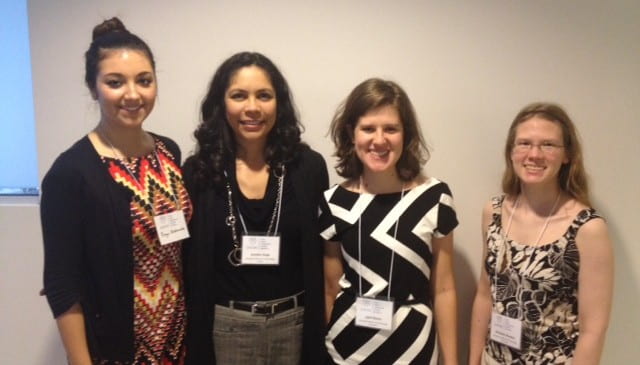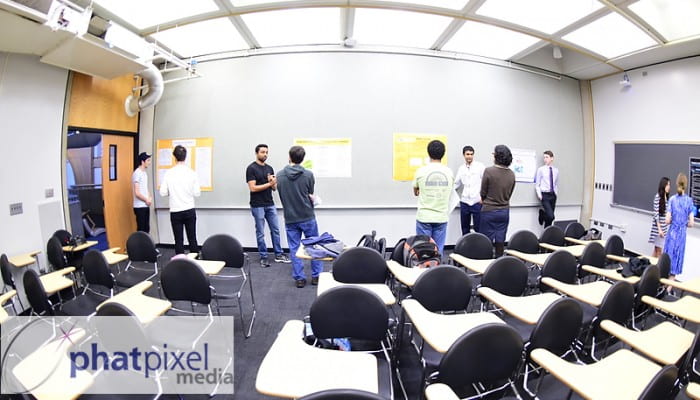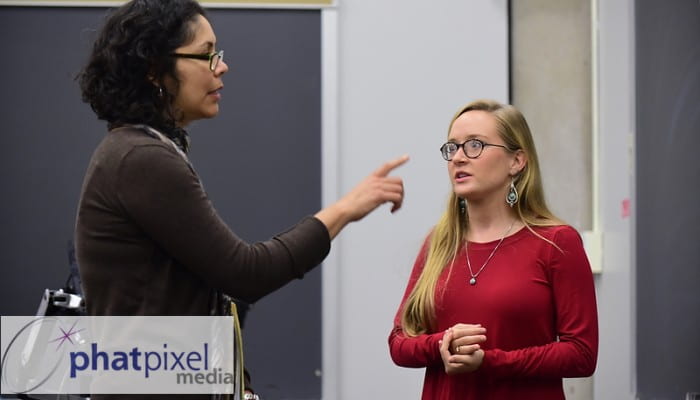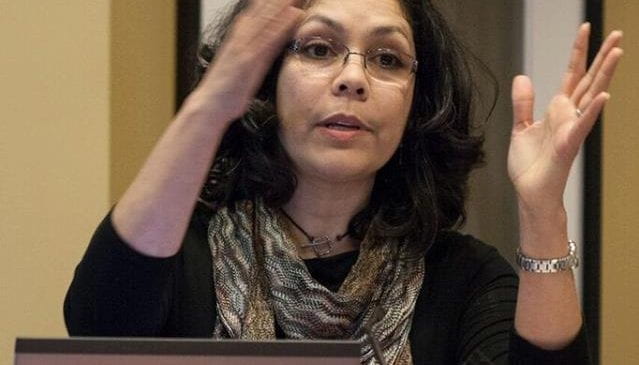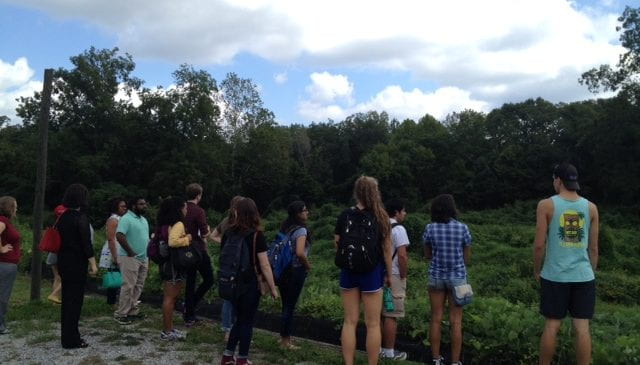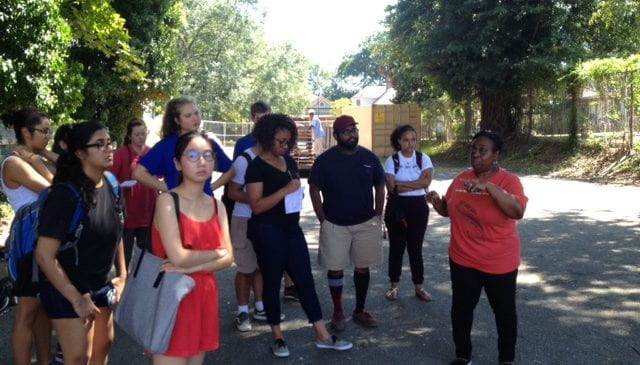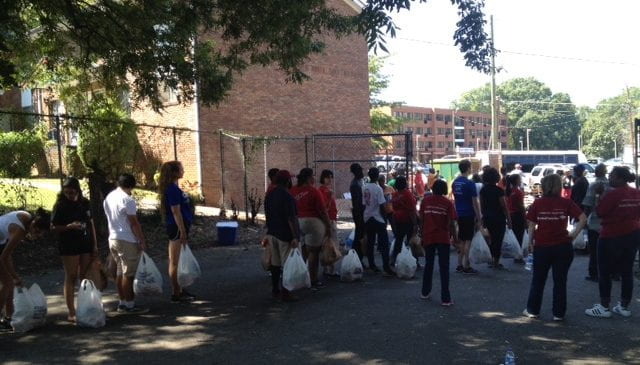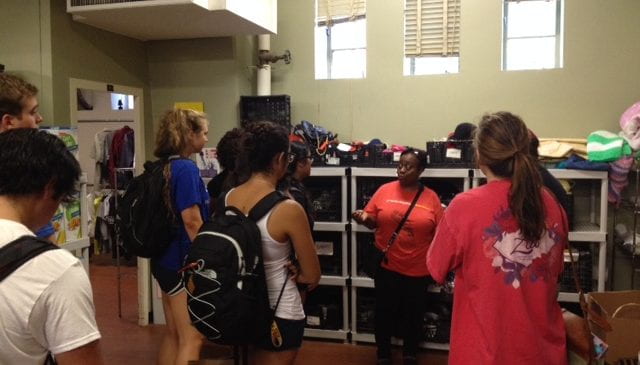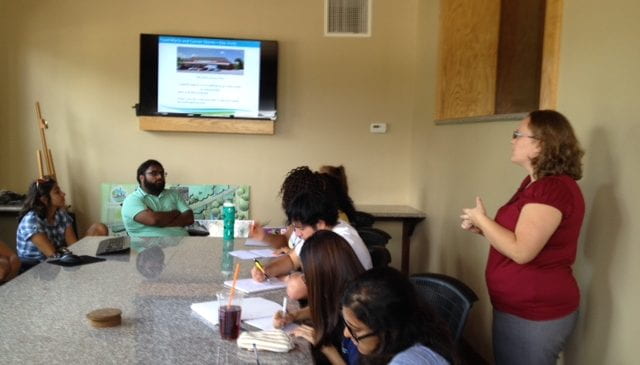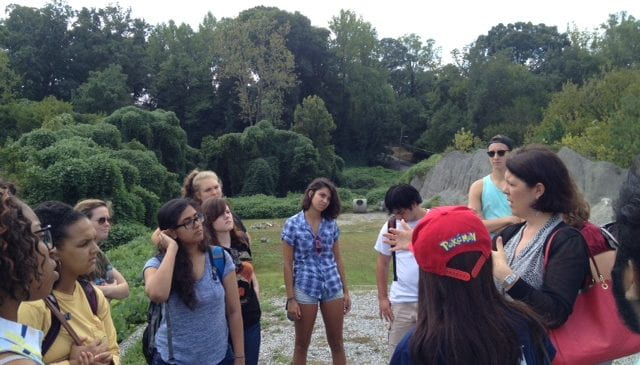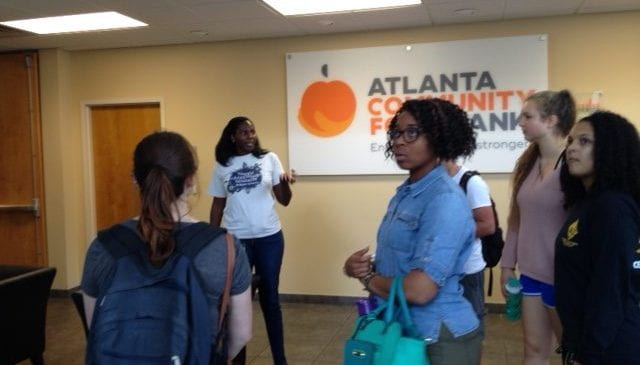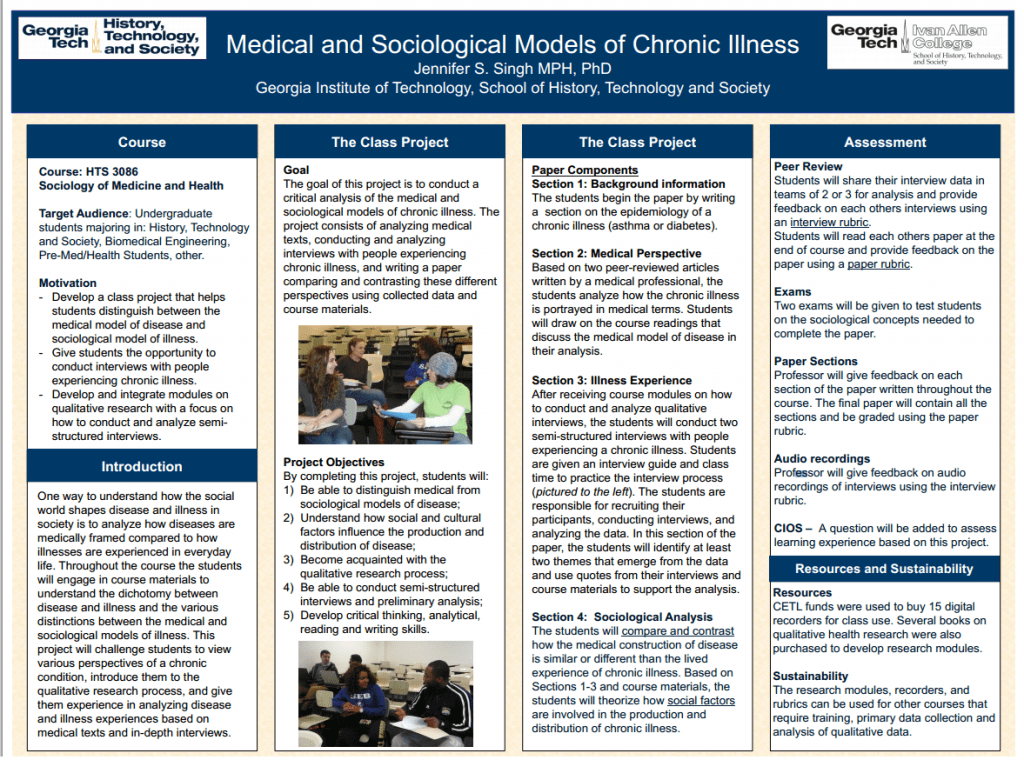I am committed to teaching coursework that engages students both inside and outside of the classroom and view teaching as an integral part of my mission as an academic faculty. An overarching goal for my courses is for students to develop a sociological imagination. That is, I want students to be able to recognize social structures and processes and how these shape their everyday lives, aspirations, identities, experiences and interactions.
Service Learning
Addressing Atlanta’s health disparities through community service approaches
As a professor at Georgia Tech, with training in public health and sociology, I designed a course in connection with Tech’s Serve-Learn-Sustain (SLS) program to help students better understand the complexities of these health disparities. I did this by collaborating with the Grove Park Foundation and also with the American Heart Association, which I met through a collaboration with the Healthy Heart Coalition.
The SLS course introduced students to heart health and bystander CPR disparities, both inside and outside the classroom. Through course readings, guest lecturers and workshops, the students learned inside the classroom about various layers attributing to social determinates of health such as the impacts of race, racism, poverty, food vulnerability and neighborhood conditions on health outcomes. The student groups also worked with each community organization on a project that addressed a particular area of need. For example, one group of students created a playground in the concrete patio next to The Laundry Centers in Grove Park.
When Sociology links with Biomedical Engineering at the Intersection of Race
In October 2019, BMED 3600 (a required course for third-year BME students) is joining with HTS 3088 (Race, Medicine, and Science), a course taught by Jennifer Singh, associate professor in the School of History and Sociology, challenging students from both classes to think more critically about the historical, social and economic challenges and considerations and disparities within the nation’s healthcare system. This past summer the two professors were able to acquire funding for the program through the Center for Serve, Learn, Sustain (SLS), the service learning initiative at Georgia Tech. Last spring, SLS was accepting proposals to link different disciplinary courses around the theme of community health, a framework that encompass social and environmental elements of health and their effects at the macro, micro, and molecular levels of analysis.
Teaching Awards and Recognition
Winner of the 2019 SLS Award for Excellence in Community-Engaged Sustainability Teaching
Undergraduate Courses
Health Inequalities Service Learning Course (HTS 3823)
This course is designed to investigate social and structural conditions such as poverty, social isolation, and segregation, as well as ascribed characteristics of gender and race that are predictive of a battery of contemporary chronic diseases and causes of premature death. The course is designed and will be instructed based on student community engagement with local non-profit organizations that serve social needs related to health. Service-Learning is an educational approach that provides students with structured opportunities to learn, develop, and reflect through active participation in thoughtful, organized community engagement.
Introduction to Sociology (SOC 1101)
This course is an overview of sociology that emphasizes the social nature of human behavior, including an introduction to culture, social structure, socialization, deviance, stratification, family, gender, religion, demography, and complex organization.
Sociology of Science (HTS 3082)
The aim of this course is to undertake a detailed examination of the sociological contribution to the analysis of science. It examines the complex relationship between science and society and takes a sociological examination of the process by which knowledge is produced. This course will take up two primary lines of inquiry:
- How is scientific knowledge produced? In what ways, if any, does sociological analysis of the production of scientific knowledge illuminate dimensions of social structure and social process?
- How do sociologists explain the role and consequences of scientific knowledge in contemporary society? What do we learn from such analyses about contemporary social life?
Sociology of Medicine and Health (HTS 3086)
This course will introduce the sociology of medicine and health (also known as medical sociology or sociology of health and illness), which is a broad field examining the social production of health, wellness, illness and mortality. This sub-discipline of sociology starts from the assumption that we cannot understand the topics of health and illness simply by looking at biological phenomena and medical knowledge, but, instead, we must also consider a variety of social, political, economic, and cultural forces. This course will explore health, illness, and health care from a sociological perspective by surveying the central topics in the field with an emphasis on the following themes:
- The social production and distribution of disease and illness
- The meaning and experience of illness
- The social organization of medical care
- The profession of medicine and bioethics
Race, Medicine, and Science (HTS 3088)
The primary objective of this course is to study the interrelationship of race, medicine, and science drawing on various literatures such as history, sociology, and anthropology. The course rigorously examines the social, political, and cultural concept of race and its usefulness as an analytical category with a emphasis on American history. In line with the
Quality Enhancement Program at Georgia Tech, the course is designed and will be instructed based on student community engagement with local non-profit organizations that serve social and medical needs related to sickle cell disease and/or HIV/AIDS. Service-learning is an educational approach that provides students with structured opportunities to learn, develop, and reflect through active participation in thoughtful, organized community engagement.
Seminar in Health, Medicine, and Society (HTS 4086)
This course is an advanced undergraduate seminar that explores the intersections between health, medicine, and society. The course will be based on selective literature drawn from medical sociology and science and technology studies. The goal of this course is to introduce students to key theoretical frameworks and case studies that critically engage in issues of health, medicine, and society in the 21st century. After an introduction to theories of medicalization and biomedicalization, units will focus on issues raised in key areas: the influence of pharmaceutical companies in defining diseases and the conduct of everyday lives; the inequalities and uncertainties surrounding genomic medicine; and the politics of health social movements.
Graduate Courses
Science, Technology, and Society: Core Seminar (HTS 6743)
Science, Technology and Society (STS) – also called Science and Technology Studies – is an interdisciplinary field of study that seeks to understand how science and technology shape society and culture and how society and culture, in turn, shape the development of science and technology. This course explores key topics, debates, and theoretical perspectives in STS. Featuring guest lectures by faculty from across the Ivan Allen College of Liberal Arts, the seminar introduces students both to a wide range of STS topics and approaches and to faculty who do research in this area. It is also the core course required for the Graduate Certificate in Science, Technology & Society.
Foundations of Socio-Historical Analysis (HTS 7001)
This course is designed to introduce graduate students to the basic tools and concepts of historical and sociological research, including introductions to archival research, ethnography,
qualitative interviews, discourse analysis, and STATA and regression analysis. It is built around the engagement with the research process, an introduction to various research methods, visits from HSOC faculty, reading and discussion, and conducting, writing and presenting research projects using primary data.
Social and Cultural Studies of Biomedicine (HTS 6123/LMC 8803) (Co-taught with Anne Pollock)
This course is a doctoral seminar that explores current scholarship in the social and cultural studies of science, technology and biomedicine in the 21st century. Although many of the themes we will address have a long history, the emphasis will be on recent interdisciplinary scholarship of current conditions, drawn principally from sociology, anthropology, and cultural studies. Objects of attention range in scale from molecules to personhood to environments of risk, and the texts for this course attend to diverse contexts of laboratory practices, clinical encounters, patient social movements and broader social debates. After an introduction to theories of biomedicalization, units will focus on issues raised in key areas: genetics, neuroscience, and circulation and tissues. This graduate seminar will explore what becomes of power, knowledge, and expertise, and their relationships to one another, under contemporary transformative conditions.
Sociology of Medicine (HTS 8803)
This course is doctoral seminar whose principal goal is to introduce students to the sub-discipline of medical sociology. In this semester, we will explore the historical context and intellectual contributions that gave rise to these traditions in medical sociology, and become familiar with many of its central scholars, theories, and works. This seminar also examines crucial sociological issues that arise in phenomena generally termed “illness,” “sickness,” “health,” “healing,” “care,” and the socio-cultural, material and historical contexts in which these phenomena are constructed or emerge.
Class of 1969 CETL Teaching Fellow 2012
This training helped me to develop a course project on the study of chronic illness experience using qualitative health research methods.
